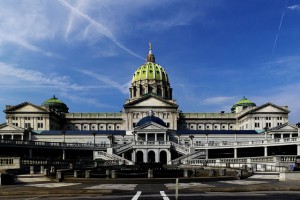The salaries of Pennsylvania’s government leaders will rise 0.8 percent in 2018 thanks to an automatic cost of living adjustment (COLA) legislated in the late 1990s.
The institution of an across-the-board COLA, particularly in light of longstanding difficulties passing annual budgets and recurring deficits, raises the question not only as to whether or not the annual COLA is justified, but if there might be some better means of linking elected and appointed government officials’ compensation to their work effort and effectiveness.
Pennsylvania is the 33rd largest state in the nation geographically, but with 12.7 million people (as per the 2010 national census) the sixth most populous. Pennsylvania’s lawmakers are the second-highest paid in the nation, with an annual base salary set to climb about $700, to $87,200 for 2018.
Top government leaders are paid much more. The highest paid, state Supreme Court Justice Tom Saylor, will see his salary increase about $1,600 to $213,750 this year, while the other six state Supreme Court judges will increase about the same, to $207,700. The base, annual salary for Gov. Tom Wolf is due to rise about $1,500 this coming year, to $194,850. Spokespeople for the governor have pointed out that he has taken to donating the COLA increases to charity given he is required by law to accept them.
“Pennsylvania has one of the most expensive, and extensive, legislatures in the U.S.,” Leo Knepper, CEO of the non-profit Citizens Alliance of Pennsylvania, said. “The annual budget for the General Assembly is somewhere in the neighborhood of $325 million. Including the 253 state legislators, there are over 3,000 employees working for the General Assembly.”
It should be noted that while these are annual salaries, the Pennsylvania General Assembly is only in session for 90 days, frequently less, of the calendar year. They do typically spend a good deal, though varying, amounts of time working in their district offices for their local constituencies and pursuing speaking engagements and other public relations opportunities, Knepper said.
The benefits of being a state lawmaker or top government official are not limited to annual COLA salary increases, however. Lawmakers pay only 1 percent of their annual salaries to offset the cost of health insurance premiums for themselves and their families. Furthermore, they receive full pensions after a vesting period of five years, and that increases along with the number of years they hold office, Knepper pointed out.
“It’s kind of relevant that Pennsylvania’s lawmakers receive a salary of $84,000 a year and they’re only in session for 90 days, and that’s above the actual average,” Knepper said. “Given that, and considering the additional benefits and perquisites they receive, there’s an economic disincentive for them to leave office and return to work in the ‘real’ world.”
Furthermore, Knepper noted that the salary and compensation packages paid to lawmakers and top officials of the executive and judicial branches of the state government are not tied to any meaningful metric. That, Knepper said, “ is an indication of the broader level of dysfunction apparent in Pennsylvania’s government.”
Whether or not leaders of any state government are entitled to automatic, annual COLA increases and how much they are compensated overall is not a simple yes or no question, according to Teri Ooms, executive director of the Pennsylvania Institute for Public Policy & Economic Development.
“I think it depends on the financial situation of the state, and the level of their salaries and compensation relative to those in other states,” she said. “I do believe that an employee of the public or non-profit sector should be paid a competitive wage because we want good people there. They need to be paid family-sustaining wages.”
There are limits, and a need for public accountability and transparency however.
Advertisements
“I also believe, however, that if they are not doing their job, they should not be re-elected, in the case of publicly elected officials, but in other situations be let go from their jobs,” Ooms said
The difficulties and rancor evident among legislators and the governor’s office in reaching agreement on funding annual budgets and how to solve the puzzle of covering persistent deficits has called into question legislators’ ability to fulfill one of, if not the, most important responsibilities they have been elected to see to.
Unwilling to agree to a Senate budget funding bill, members of the House Republican Caucus have staged a high profile campaign associated with their investigation of specialized program budgets. The main thrust was to identify funds that could be used to cover this year’s budget shortfall, as well as highlight the inadequacy, and irresponsibility, of Democratic Party General Assembly members “tax and spend” policies.
Unfortunately, an extensive investigation of state special purpose fund budgets undertaken by the Keystone Research Center’s Pennsylvania Budget and Policy Center program could not find any surpluses that were not justified.
“There are no surpluses that aren’t dedicated to legitimate purposes of the Commonwealth,” Program Director Marc Stier said. “Some maintain surpluses, but those are essential in terms of the ability to do what they have been dedicated to do.”
One such special purpose fund serves as insurance for those involved in mining accidents, for example. Another insurance-related special purpose fund supports injured Gulf War veterans. A third typically maintains surplus funds to cover the costs of public transportation – new buses and subway cars, for example – while a fourth helps local communities upgrade their 911 and emergency-disaster response systems, Stier elaborated.
“That’s a pretty important public service. We know, for instance, that Philadelphia’s 911-emergency response system is badly in need of an upgrade,” he said. “Every business in the world keeps cash and liquid financial instruments on hand to cover unexpected, but regular, expenses in order to keep running on an ongoing basis. Republicans keep on saying that government should be run like a business, but this is exactly how businesses are run, and yet they come out and malign them for it.”
Furthermore, raiding the bank accounts of state special purpose funds in order to cover state general fund budget deficits in effect would be robbery, Stier added.
“We think it’s a lot of nonsense. It is not pork to be funding mass transit, or to provide insurance for mining collapses. In fact, we’d be robbing them because some of them pay into those funds.”









